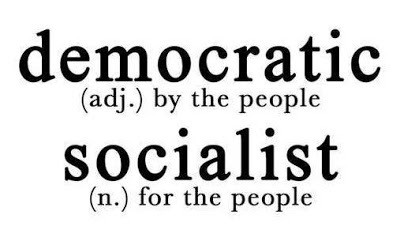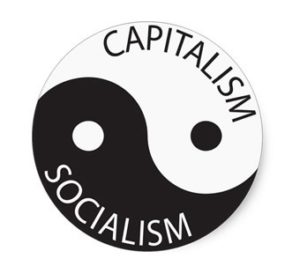Chances Are, You’re Already a Democratic Socialist
6 2016

Are you a democratic socialist? If you haven’t already thought about it, yes, you probably are. In my experience, most decent people in the United States today are democratic socialists, even if they don’t know it yet.
Democratic socialism is the main reason we’re not living in a fascist or feudalist country right now.
Essentially all developed countries on earth today, including the US, have a mix of two basic economic systems: socialism and capitalism. Let’s look at these two fundamental approaches to distribution of wealth and power.
socialist — in the interest of society
capitalist — in the interest of capital
Capitalist policies favor people and corporations who have the most wealth or capital to invest to create more wealth. If left unattended, over a few decades, a purely capitalist system will crystallize a small .01% of a population who are extremely wealthy and a massive 99.9% underclass of workers and drifters without rights or privileges.

Democratic socialism balances capitalism. Democratic socialist policies that we already have in place — free public education, a minimum wage, weekends, public parks, public police and firefighters, public roads and bridges, snow plows, clean water, food safety, etc. — spread wealth and power just enough that our current economic system feels ( barely) egalitarian rather than feudalist or fascist.
Capitalist policies have run amok for decades in the United States, and there are hundreds of signs today that our socialism-capitalism balance is out of whack, from wages to water. Here are just four examples:
- Banks. These organizations, the central players in capitalism, have grown ridiculously huge and powerful and are making record profits while paying little to nothing in taxes. Banks are getting away with fraud, such as betting on both sides of the housing collapse, the CDO scandals, etc., and they’re paying minimal fines while still growing bigger and more powerful. Decent democratic socialist policies will break up the big banks so that they serve society and the 99.9% rather than engage in fraud and other high-risk investments to make themselves still more wealthy while robbing what little wealth remains in the hands of the working and middle classes.
- War. We’re seeing more wars in the Middle East, Africa, and elsewhere these days. Democratic socialists will push for peace, as the 99.9% basically never want war. Capitalism, on the other hand, always pushes for more wars, as there is tremendous profit to be made via war — not just for military corporations who sell weapons to both sides, but also to gain geopolitical advantage over capitalists in the .1% in rival countries.
- Health. Capitalism has no use for guaranteed healthcare, as services provided freely by government reduce the power of the .1%. Sick people remaining sick is fine, in the view of capitalism, as their ill-health and the needs they bring to bear on family are part of the reason the 99.9% stay powerless; if there is to be healthcare it should be tied to wage jobs so that the corporations and the invested capital hold power over the health of the 99.9%, and any healthcare program should support other capitalist corporations, such as for-profit healthcare companies. Democratic socialists view health very differently and see universal healthcare not just as a basic part of a decent society but as a significant indicator of whether a society has moved beyond feudalism/slavery. Obama’s healthcare plan — mandatory healthcare from corporations — is also the system proposed by Nixon in the early 1970s; it is slightly better than no system at all but is more in tune with a feudalist society than a democratic socialist one. A healthy society is a better society, and like education, healthcare should be seen as a basic human right.
- Elections. Democracy is obviously a democratic socialist ideal. Because elections are the lifeblood of a modern democracy, democratic socialists want free and fair elections run by highly skilled election workers, transparent voting systems, high voter turnout, and rigorous nonpartisan polling. Capitalism, on the other hand, has little use for democracy other than to lend legitimacy to itself, and will want politicians who can be purchased, polls that are privately-funded, and dysfunctional voting systems that can easily be rigged.
As can be seen from these four examples, capitalism and democratic socialism are often at odds, but they can operate in a healthy tension. They can and must be tuned, like a musical instrument or a sophisticated machine, to interact together in harmonious symbiosis.
If our economic system were a car, capitalism would be the engine — a tremendous motor that utilizes people’s profit motive and inherent ingenuity to unleash economic growth. Democratic socialism would be the steering wheel, utilizing people’s wisdom and altruism to create a livable world for all. Capitalism alone considers only the interests of capital — not people — and in steadily concentrating all wealth in the hands of a few will propel society over the cliff of fascism or feudalism. Democratic socialism enables the people — the 99.9% — to enact government policies and regulations that will steer that powerful capitalist engine in the direction of a beautiful, just, inclusive, and satisfying society.

Capitalists and their corporations have wrested most of the power over the past few decades and we have moved too far away from democratic socialist policies. Today we need to bring our economic system back into balance.
Me, I believe in balance, in democracy, and in a society run for the greatest good of all people. So, yes, of course I’m a democratic socialist.
You probably are too.
This article also appeared at:




Connect & Share